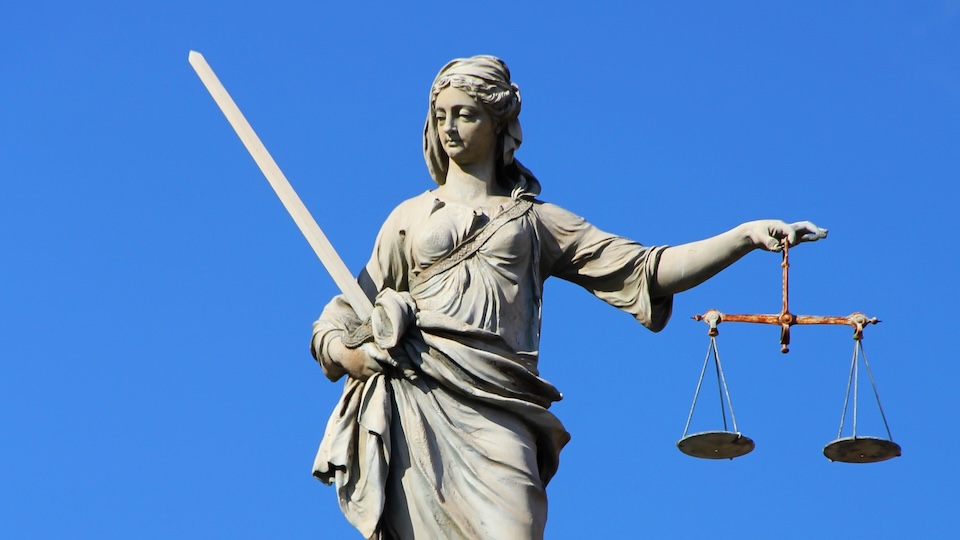Pope’s General Audience – April 3, 2024
Pope Francis
Wednesday, April 3, 2024

Justice statue by John van Nost the Younger on the Gate of Justice, Dublin Castle. Wikimedia Commons.
During his weekly General Audience Pope Francis reflected on the virtue of justice or righteousness. He said that "The righteous person is upright, simple, and straightforward; he does not wear masks, he presents himself for what he is, he speaks the truth. The words 'thank you' are often found on his lips: he knows that no matter how generous we strive to be, we always remain indebted to our neighbour. If we love, it is also because we have been loved first." Read the full text of his address below. You can watch the full broadcast on Salt + Light TV on Thursday night at 7:00 pm ET, 4:00 pm PT and then on Salt + Light Plus.Dear brothers and sisters, Happy Easter, good morning! Here we are at the second of the cardinal virtues: today we will talk about justice. It is the quintessential social virtue. The Catechism of the Catholic Church defines it as “the moral virtue that consists in the constant and firm will to give their due to God and neighbour” (#1807). This is justice. Often, when justice is mentioned, the motto that represents it is also quoted: “unicuique suum” – that is, “to each his own.” It is the virtue of law, which seeks to regulate the relations between people equitably. It is represented allegorically by the scales, because it aims to “even the score” between people, especially when they risk being distorted by some imbalance. Its purpose is that in society, everyone is treated in accordance with the dignity proper to them. But already the ancient masters taught that for this, other virtuous attitudes are necessary, such as benevolence, respect, gratitude, affability, and honesty: virtues that contribute to a good coexistence between people. Justice is a virtue for good coexistence between people. We all understand how justice is fundamental for peaceful coexistence in society: a world without laws respecting rights would be a world in which it is impossible to live; it would resemble a jungle. Without justice, there is no peace. Without justice, there is no peace. Indeed, if justice is not respected, conflicts arise. Without justice, the law of the prevalence of the strong over the weak is entrenched, and this is not just. But justice is a virtue that acts on both a large and small scale: it regards not only the courtroom, but also the ethics that characterize our daily lives. It establishes sincere relations with others: it realizes the precept of the Gospel, according to which Christian speech is “simply ‘Yes’ or ‘No’; anything more than this comes from evil” (Matthew 5:37). Half-truths, double-talk intended to deceive one’s neighbour, the reticence that conceals true intentions, are not attitudes in keeping with justice. The righteous person is upright, simple, and straightforward; he does not wear masks, he presents himself for what he is, he speaks the truth. The words “thank you” are often found on his lips: he knows that no matter how generous we strive to be, we always remain indebted to our neighbour. If we love, it is also because we have been loved first. In tradition we can find countless descriptions of the righteous person. Let us look at some of them. The righteous person reveres laws and respects them, knowing that they constitute a barrier protecting the defenceless from the tyranny of the powerful. The righteous person does not think only of his own individual wellbeing, but desires the good of society as a whole. Therefore, he does not give in to the temptation to think only of himself and of taking care of his own affairs, however legitimate they may be, as if they were the only thing that exists in the world. The virtue of justice makes it clear - and places this need in the heart - that there can be no true good for oneself if there is not also the good of all. Therefore, the righteous person keeps watch over his own behaviour, so that it is not harmful to others: if he makes a mistake, he apologizes. In some situations, he goes so far as to sacrifice a personal good to make it available to the community. He desires an orderly society, where people give lustre to the office they hold, and not the office that gives lustre to people. He abhors recommendations and does not trade favours. He loves responsibility and is exemplary in promoting legality. Indeed, this is the way of justice, the antidote to corruption: how important it is to educate people, especially the young, in the culture of legality! It is the way to prevent the cancer of corruption and to eliminate criminality, removing the ground from beneath it. Furthermore, the righteous person shuns harmful behaviour such as slander, perjury, fraud, usury, mockery, and dishonesty. The righteous person keeps his word, returns what he has borrowed, pays fair wages to all labourers: a man who does not pay fare wages to workers is not just, he is unjust; he is careful not to pass reckless judgments on his neighbour, and defends the reputation and good name of others. None of us knows if, in our world, righteous people are numerous or as rare as precious pearls. But there are people who draw grace and blessings both upon themselves and upon the world in which they live. They are not losers compared to those who are “cunning and shrewd,” for, as Scripture says, “He who pursues righteousness and kindness will find life and honour” (Proverbs 21:21). The righteous are not moralists who don the robe of the censor, but upright people who “hunger and thirst for righteousness” (Matthew 5:6), dreamers who yearn in their hearts for universal brotherhood. And, today especially, we are all in great need of this dream. We need righteous men and women, and this will make us happy. __________________________ APPEAL Unfortunately, sad news continues to come from the Middle East. I reiterate my firm call for an immediate ceasefire in the Gaza Strip. I express my deep regret for the volunteers killed while engaged in the distribution of humanitarian aid in Gaza. I pray for them and their families. I renew my appeal for the exhausted and suffering civilian population to be given access to humanitarian aid and for the hostages to be released immediately. Let us avoid all irresponsible attempts to broaden the conflict in the region, and let us work so that this and other wars that continue to bring death and suffering to so many parts of the world may end as soon as possible. Let us pray and work tirelessly for weapons to be silenced and for peace to reign once again. And let us not forget tormented Ukraine; so many dead! I hold in my hands a rosary and a book of the New Testament left by a soldier who died in the war. This boy was called Oleksandr, Alexander, and he was 23 years old. Alexander read the New Testament and the Psalms, and in the Book of Psalms he had underlined Psalm 130: “Out of the depths I cry to thee, O Lord! Lord, hear my voice!” This 23-year-old boy died in Avdiïvka, in the war. He had his life ahead of him. And this is his rosary and his New Testament, which he read and prayed. I would like us to take a moment of silence, all of us, thinking about this boy and many others like him who died in this folly of war. War always destroys! Let us think of them, and let us pray. Text courtesy of Libreria Editrice Vaticana
Related Articles:
Category: Colombia, Highlight, Pope Francis, 教宗方濟各
Tag: Colombia, Pope Francis, 哥倫比亞, 教宗方濟各
教宗致函慈幼會會士:毫無保留地為他人服務
Tuesday, April 8, 2025
 鹽與光
鹽與光
教宗方濟各致函慈幼會第29屆全會代表大會與會者,祝賀新任總會長歐達德神父工作順利,感謝范達民樞機這些年來的服務。教宗鼓勵眾位會士在不同於以往的挑戰中充滿熱情。
從聖伯多祿火車站到伯多祿大殿:新的行人道路在禧年啟用
Monday, April 7, 2025
 鹽與光
鹽與光
2025年4月5日,羅馬市長瓜爾蒂耶里為「茉莉花道」"Passeggiata del Gelsomino" 主持啟用儀式。這條從羅馬聖伯多祿火車站到梵蒂岡大殿的行人道路經過翻新工程後,使朝聖旅途變得更加安全舒適。
教宗親臨聖伯多祿廣場:病床能成為神聖之地
Monday, April 7, 2025
 鹽與光
鹽與光
教宗方濟各自這次患病以來,首次出現在聖伯多祿廣場上。在禧年病患和醫療工作者慶典的彌撒結束之際,教宗向所有參與慶典的人士表達問候和感謝。他在講稿中指出,病床能成為神聖之地,我們能在那裡聽見上主的聲音,從而提振並堅固信德。
敞開心扉說「亮」話:誠實謙卑地面對內心
Saturday, April 5, 2025
 鹽與光
鹽與光
王新亮神父:「主內的弟兄姊妹們,在若望福音中耶穌曾經對法利撒人說:「你們如果是瞎子,就沒有罪了;但你們如今說:我們看得見,你們的罪惡便存留下了。」猶太人最大的錯不是他們沒有認出耶穌,而是認出了耶穌,但是已經不能放下自己。」
1
2
3
4
5
6
7
8
9
10
11
...
1430
>>
SUPPORT LABEL
$50
$100
$150
$250
OTHER AMOUNT
DONATE
Receive our newsletters
Stay Connected
Receive our newsletters

Stay Connected












